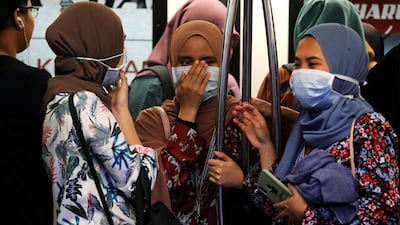As the death toll from the current coronavirus rises, the organism itself remains invisible to the human eye but signs of the fear it arouses are very visible. On a recent trip to the Malaysian island of Penang it seemed that everyone, from the airport staff to our taxi driver, was wearing face masks. We had to have our temperatures taken to enter the hotel, while all the pharmacies we passed had notices saying that they had run out of masks.
Fear can turn readily to obsession and then panic. There are close links between China and South East Asia, with tens of millions from the former taking holidays in the latter every year. It is no surprise that cases of infection by the virus have been found throughout the region; the first fatality outside the mainland has been confirmed in the Philippines.
Sadly, it was therefore predictable that a rise in xenophobic incidents targeting not just Chinese but other Asians too have been recorded in countries far away, including France, Italy, the UK, Australia and Canada. In Rome, the director of a music school told students from China, South Korea and Japan to stay home until doctors had declared them free from the virus. South-East and East Asians have faced hostility in a range of western countries, with the backlash so great in France that a hashtag, #JeNeSuisPasUnVirus – I am not a virus – has been trending among Chinese French residents.















All this serves to remind us of the tremendous importance of combating fake news – the force driving much of this. Strange, sensationalist stories about the dangers of eating Chinese food have been in circulation. In Canada, the head of Toronto’s public health department warned that misinformation was creating “unnecessary stigma against members of our community".
One Australian newspaper called the coronavirus a “Chinese virus”, despite the country’s former race discrimination commissioner, Tim Soutphommasane, pointing out that “viral diseases don’t have ethnic, racial or national characteristics".
In Indonesia, a WhatsApp message warned that buying Chinese clothes could lead to infection. In Malaysia, the situation was getting so out of hand a week ago that Dzulkefly Ahmad, the health minister, said: “We have two problems at hand. One is the virus, but the more pressing one is the viral fake news on the spread of the virus.” To counter this, he said: “We will have daily updates and hope the public will go to reliable sources for news instead of believing what goes viral on social media.”
Despite repealing an Anti-Fake News Act passed in 2018, the Malaysian authorities fortunately still have the tools to back up information campaigns with punitive action. So far, six people have been arrested for spreading misinformation about the virus under the Communications and Multimedia Act – a law that has real teeth, as convictions can lead to a fine of up to RM50,000 (Dh44,610) or a one-year jail sentence.
Singapore has also used its relatively new Protection from Online Falsehoods and Manipulation Act, or Pofma, to move against those posting falsehoods about the virus online. Lee Hsien Loong, the city-state’s prime minister, was unapologetic about doing so. “People who are making up stories, people who are deliberately fomenting fear, uncertainty and doubt,” he said. “We’ve acted promptly against them using Pofma.”
Both countries have been right to do so, as it might be a miracle that malicious falsehoods have not yet led to outright violence and even deaths. In too many others, however, the elevation of free speech into a kind of holy grail of human rights that should never be marred by any restrictions has allowed fake news to flourish and spread unchecked. I refer here not just to misinformation about the coronavirus. Fake news – or downright lies – have been a particular poison to political discourse in America, as I have previously written, where free-speech laws set a particularly high bar for defamation and libel.
This has provided cover not just for the near-unending series of outlandish claims and plain untruths that appear on President Donald Trump’s twitter feed, but also a state of affairs whereby figures in public life have falsely accused their rivals of crimes with no legal rebuke for doing so. And this is not new. The Trump administration might be particularly blatant in its promotion of “alternative facts”, but the ground has been laid for such unashamed disregard for the truth for decades.
One answer to this lies in policing the truth more carefully, in clamping down and being unafraid to prosecute when necessary. For any “human right” to tell lies that cause real damage and leave publics bewildered about what and whom to believe is not worth the dignity of so exalted a title.
Another lies in education, and in this Finland provides a superb example. The country incorporated a programme to instill critical thinking and to develop how to assess reliability of information into its national school curriculum in 2016. Thousands of government employees and civil servants have also been trained in the approach over the past few years. It has had results. According to one annual survey of 35 European countries, Finland is now the most resistant by far to fake news.
There are lessons to be learned here; and I do not have space now to go into the role of big tech, nor the puzzling gullibility of many who used to rely on trusted media that checked their facts but now appear to believe anything that appears on their phone.
But the falsities leaking and swirling around the coronavirus epidemic should sharply focus our attention once again on fake news. In the short term, it might not be as harmful as this frightening new infection. In the long term, though, it is undoubtedly far, far more dangerous.
Sholto Byrnes is a commentator and consultant in Kuala Lumpur and a corresponding fellow of the Erasmus Forum


